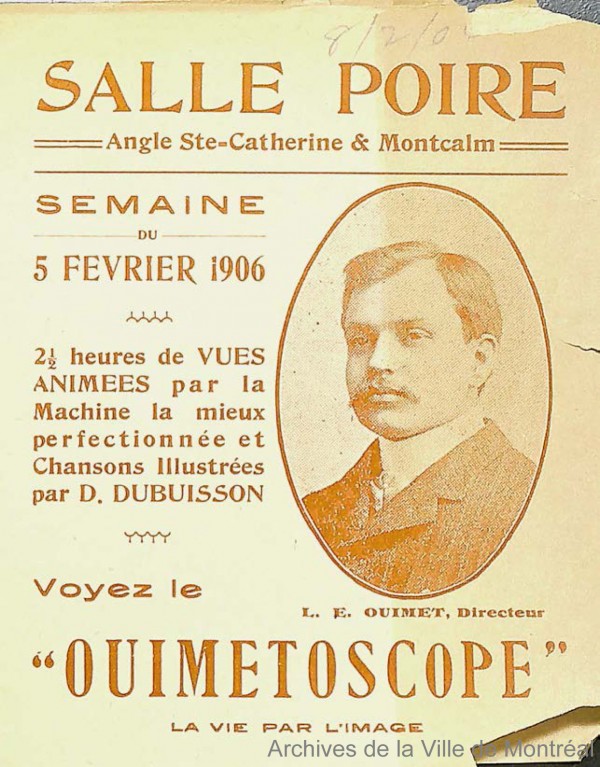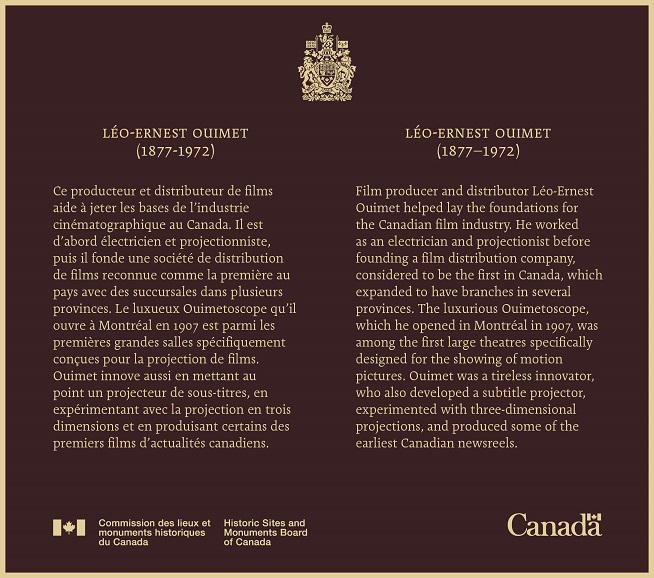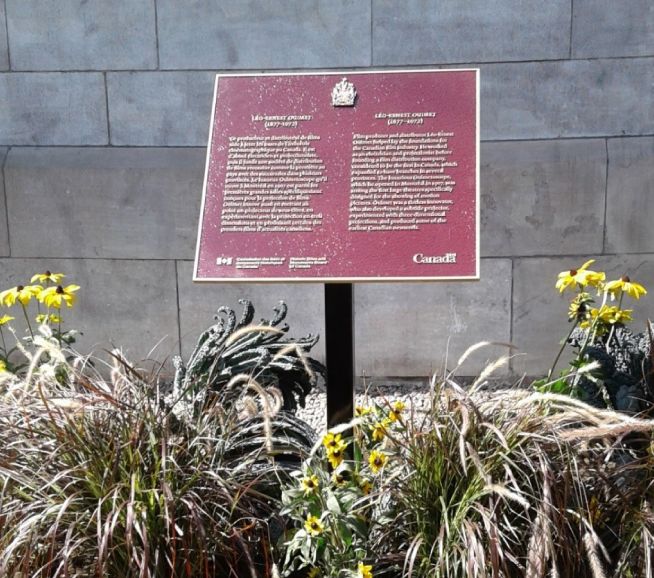Léo-Ernest Ouimet National Historic Person (1877-1972)

© Archives de la Ville de Montréal, BM1-11_11op-1906-1-1
Léo-Ernest Ouimet was designated a national historic person in July 2018.
Historical importance: An important pioneer in the cinema industry in Canada as a movie theatre operator, film distributor, filmmaker, producer and inventor.
Commemorative plaque: 335 de Maisonneuve Boulevard East, Montréal, Quebec
Film producer and distributor Léo-Ernest Ouimet helped lay the foundations for the Canadian film industry. He worked as an electrician and projectionist before founding a film distribution company, considered to be the first in Canada, which expanded to have branches in several provinces. The luxurious Ouimetoscope, which he opened in Montréal in 1907, was among the first large theatres specifically designed for the showing of motion pictures. Ouimet was a tireless innovator, who also developed a subtitle projector, experimented with three-dimensional projections, and produced some of the earliest Canadian newsreels.
Léo-Ernest Ouimet
Active in the world of cinema from 1904 to 1935, Léo-Ernest Ouimet was a pioneer as a movie theatre operator, film distributor, filmmaker, and producer in the early Canadian film industry. An innovator in movie theatre operation and a genuine motion picture entrepreneur, Ouimet's vision incorporated all aspects of the cinema, and he managed to make the concept his own for some 15 years. In January 1906, Ouimet opened the Ouimetoscope, a movie theatre located in downtown Montréal. The opening of this cinema, one of the very first in Canada, marked the beginning of organized cinema operation in Quebec. His second Ouimetoscope, built to his own specifications, was inaugurated in 1907 on the same site. This “movie palace” is regarded as the second largest theatre in the world built exclusively for motion pictures. By founding the Ouimet Film Exchange in 1905, which expanded rapidly to have branches in several provinces and is considered the first film distribution company in Canada, Léo-Ernest Ouimet supported the rising demand for films, which in turn led to the establishment of new theatres. In addition, his newsreel productions, the very first in Canada, and his fictional films represent the first significant effort to set up a Quebec film industry created by local entrepreneurs for their fellow Quebeckers.


Born on 16 March 1877 in Saint-Martin-de-Laval, Quebec, Ouiment initially worked as a lighting designer at the Théâtre National Français (1901) and as a projectionist at Sohmer Park in Montréal around 1903-04. In the age of fairground cinemas (1896-1906), he bought his first projector and presented his own travelling shows in parks and church halls. Aware that distribution was a key component of the cinema economy, in 1905 he founded the Ouimet Film Exchange. On 1 January 1906, he opened the Ouimetoscope in a former cabaret hall at the intersection of Sainte-Catherine and Montcalm streets in Montréal. On 31 August 1907, he opened his second cinema; this luxury cinema had 1,200 seats, compared to the 1,100 seats of the deluxe Nationoscope of Georges Gauvreau which had opened three months earlier.
With his operator Lactance Giroux, Ouimet innovated again in 1907 by producing newsreels. Then, having become the Pathé company's exclusive representative in Canada, he founded the Pathé Famous Players Feature Syndicate in January 1914, which exclusively represented and distributed Pathé products and distributed Ouimet's newsreels. By 1915, this company had six branches in provinces across the country. In 1918, Ouimet founded British Canadian Pathé News, which produced films about Canadian current events and advertising films until 1922. That year, he embarked on making fictional works interspersed with documentary segments. Unable to compete with the Americans in the world of fictional films and, on the brink of bankruptcy, he soon left for California. Why Get Married? (1923), his sole fictional feature film, was filmed with Hollywood actors and resources. He returned to Montréal in 1933, and in November 1934 he began showing talking films produced in France at the Imperial Theatre. In 1935, a fire broke out in this theatre, resulting in his financial ruin. Léo-Ernest Ouimet died on 2 March 1972 in Montréal, at the age of 94.
The National Program of Historical Commemoration relies on the participation of Canadians in the identification of places, events and persons of national historic significance. Any member of the public can nominate a topic for consideration by the Historic Sites and Monuments Board of Canada.
- Date modified :